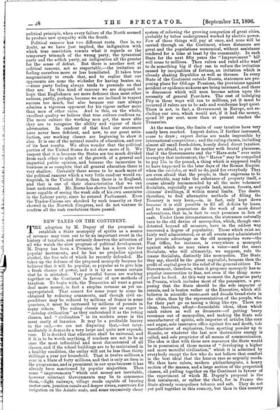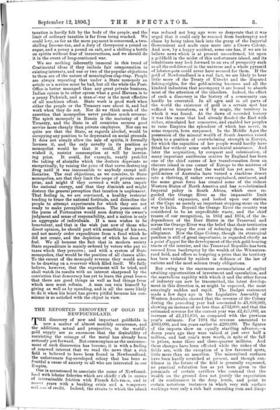NEW TAXES ON THE CONTINENT. T HE adoption by M. Dupuy
of the proposal to establish a State monopoly of spirits as a source of revenue may turn out to be an important event in the history of taxation, and certainly deserves the attention of all who watch the slow progress of political development. M. Dupuy has been a Premier, he has a keen eye for popular movements, and he has no prejudice against alcohol, the free sale of which he recently defended. He takes up the defence of the proposed monopoly because he believes that it will be popular, so popular as to give him a fresh chance of power, and it is by no means certain that he is mistaken. Very powerful forces are working together on the Continent in favour of new methods of taxation. To begin with, the Treasuries all want a great deal more money, in fact a surplus revenue as yet un- appropriated. That cannot for some yea/7 to come be obtained by reducing armaments, and though civil ex- penditure may be reduced by millions of francs in some quarters, it must be increased by millions of pounds in many others. The ruling classes are just as eager to " develop civilisation " as they understand it as the voting classes, and "civilisation" in its modern sense is the most costly of luxuries. It may be a profitable luxury in the end,—we are not disputing that,—but inter- mediately it demands a very large and quite new expendi- ture. It is decided that education shall be universal, and if it is to be worth anything, if teachers are not to be at once the most influential and most discontented of all classes, and if the school buildings are to be maintained in a healthy condition, the outlay will not be less than thirty shillings a year per household. That is twelve millions a year in a State of forty millions, and that is only an item in the programme, and is prominent in our eyes because it has already been sanctioned by popular majorities. Then some " improvements " which cost money are inevitable, however reluctant Governments may be to commence them,—light railways, village roads capable of bearing motor-cars, junction canals and deeper rivers, reservoirs for irrigation on the Asiatic scale, and some excessively chear system of relieving the growing congestion of great cities, probably by tubes underground worked by electric power. Few of these things will pay at once, and none will be carried through on the Continent, where distances are great and the populations economical, without assistance rendered for a time at least by the community. In each State for the next fifty years the "Improvement" bill will come to millions. Then rulers and ruled alike want' to do something big if they can to reduce the irritation caused by inequalities of fortune, an irritation which is already shaking Republics as well as thrones. In every State of the Continent outside Russia, statesmen are pro- posing plans for Old-age Pensions, the provisions against accident or epidemic sickness are being increased, and there is discussion which will soon become action upon the necessity of general Poor-laws. The cost of indulging Pity in these ways will run to millions, yet it must be incurred if rulers are to be safe and residuums kept quiet. There is not, in fact, a Government in Europe, not ex- cluding our own, which would not, if it had the money, spend 30 per cent. more than at present reaches the Treasuries.
At the same time, the limits of easy taxation have very nearly been reached. Import duties, if further increased, cease to draw ; export duties are made impossible by international competition ; and the ruling classes, including almost all small freeholders, keenly dread direct taxation. They are afraid, to put the matter with brutal plainness, that if the Governments and the "Have-nots" ever unite to employ that instrument, the " Haves" may be compelled to pay 15s. in the pound, a thing which is supposed really to have happened in the later days of the Roman Empire; when the curiales, or well to do, paid for everybody. They are even afraid that the people, in their eagerness to be comfortable, may take the substance of property itself, a course already recommended by all the more vehement Socialists, especially as regards land, mines, forests, and citizens' dwellings, if within mural limits. The desire, therefore, to find alternative methods of filling the Treasury is very keen,—is, in fact, only kept down because it is still possible to fill all deficits by loans, and to make guarantees do the work of more direct subventions, that is, in fact to emit promises in lieu of cash. Under these circumstances, the statesmen naturally turn to the old device of monopolies, which, though once detested beyond all measure, have in the oddest way recovered a degree of popularity. Those which exist are fairly well administered, or at all events not administered for private advantage as the old monopolies were—the Post Office, for instance, is everywhere a monopoly against which no man raises a voice—and the sane] Socialists, who will ultimately, we suppose, rule the insane Socialists, distinctly like monopolies. The State, they say, should be the great capitalist, because then the profit of capital goes to the relief of the general citizen The Government, therefore, when it proposes monopoly has nc popular insurrection to fear, not even if the thing nono. polised be food. At this very moment the Agrarian party in Prussia, which includes most of the peasantry, is pro. posing that the State should be the sole importer of cereals, and is beaten rather oy the Executive, which still believes in scientific economies and dreads bread-riots in the cities, than by the representatives of the people, who for their part go on taxing a thing like rye. There are ideas, therefore, afloat—formidable ideas, ideas which catch rulers as well as dreamers—of getting heavy revenues out of monopolies, and making the State sole manufacturer of spirits, sole importer of articles like corn and sugar, sole insurance office against fire and death, eole manufacturer of explosives, from sporting powder up to Romite, or whatever the last new destructive energy is called, and sole proprietor of all means of communication. The idea is that with these new resources the State would be in possession of those means of " developing a higher and more merciful civilisation," which it is admitted by everybody except the few who do not believe that comfort is the best ideal that the human race so urgently needs. We thus have rulers, modern philanthropists, a heavy section of the masses, and a large section of the propertied classes, all pulling together on the Continent in favour of the experiment of which M. Dupuy's proposal is the first instalment, or rather the third, for in France the State already monopolises tobacco and salt. They do not yet pull together in this country, but then in this country taxation is hardly felt by the body of the people, and the limit of ordinary taxation is far from being reached. We could levy, as far as the mere payment is concerned, a two- shilling Income-tax, and a duty of threepence a pound on sugar, and a penny a pound on salt, and a shilling a bottle on spirits without fear of insurrections, and we should do it in the event of long-continued war.
We see nothing inherently immoral in this trend of Continental ideas if they include fair compensation to existing interests, and one or two of the popular objections to them are of the nature of meaningless clap-trap. People are always repeating that under a State monopoly an article or a service must be bad, but all the while the Post- Office is better managed than any great private business, Indian opium is to other opium what a good Havana is to a penny Pickwick, and a man-o'-war is the most effective of all machines afloat. State work is good work when either the people or the Treasury care about it, and bad work when they do not. Nor do we think much of the assertion that monopolies never produce much revenue. The spirit monopoly in Russia is the mainstay of the Treasury, and the State in all countries secures good service more cheaply than private employers. Nor can we quite see that the State, as regards alcohol, would be occupying any position to be deprecated on social grounds. It does not simply allow the sale of spirits, it formally licenses it, and the only novelty in its position as monopolist would be that it could, if the people wished it, restrict consumption at will by increas- ing price. It could, for example, nearly prohibit the taking of absinthe which the doctors deprecate so energetically, by raising the price of that nerve-destroying drug until it was inaccessible to anybody except mil- lionaries. The real objections, as we conceive, to State monopolies, are that they limit the scope of private enter- prise, and might if they covered a wide area impair the national energy, and that they diminish and might destroy the general perception that taxation is unpleasant. That feeling is, we are convinced, a healthy restraint. tending to brace the national fortitude, and disincline the people to attempt experiments for which they are not ready to make perceptible sacrifices. The possession of the purse of Fortunatus would soon destroy its owner's judgment and sense of responsibility, and a nation is only an aggregate of individuals. If a man wishes to be benevolent, and that is the wish just now of those who direct opinion, he should part with something of his own, and not merely order expenditure from a fund which he did not create, and the depletion of which he does not feel. We all bemoan the fact that in modern society State expenditure is mainly ordered by voters who pay no taxes which they perceive; and with a system of State monopolies, that would be the position of all classes alike. To the extent of the monopoly revenue they would seem to be drawing on a reservoir which filled itself. We fully believe, however, that the experiment will be tried, and shall watch its results with an interest sharpened by the conviction that democracy has yet to learn the great lesson that there are good things as well as bad things from which men must refrain. A man can ruin himself by giving as well as by spending, and is all the more likely to do it when his heart has grown pitiful because his con- science is so satisfied with the object in view.



































 Previous page
Previous page